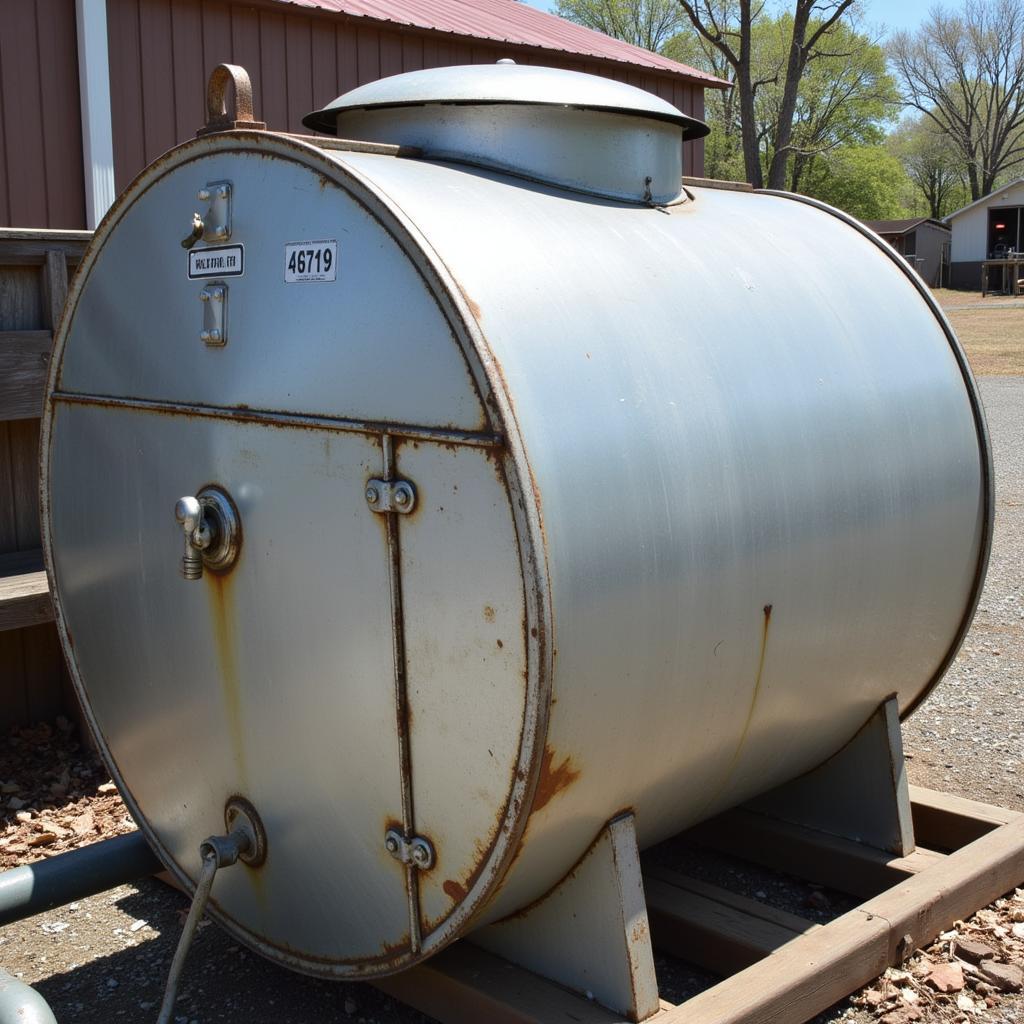Providing your horses with fresh, clean water is crucial for their health and well-being. Horse Tanks are essential for this, and choosing the right one can make a significant difference in your horse’s hydration and overall health. This guide will delve into the various types of horse tanks available, the factors to consider when making your selection, and how to maintain them for optimal performance.
Types of Horse Tanks
Several different types of horse tanks cater to various needs and environments. Each has its advantages and disadvantages, so choosing wisely is essential.
- Galvanized Steel Tanks: These are a popular choice due to their durability and resistance to rust and corrosion. However, they can be heavy and difficult to move. In colder climates, the water in galvanized steel tanks can become icy, requiring heating solutions.
- Plastic Tanks: Lightweight and easy to clean, plastic horse tanks are a cost-effective option. However, they can be susceptible to cracking in extreme temperatures or from impacts. Look for UV-resistant plastics for longer lifespan.
- Rubber Tanks: These are incredibly durable and can withstand harsh weather conditions. They are also less prone to freezing than metal tanks. Rubber tanks are often used in pastures and other outdoor settings.
- Concrete Tanks: Concrete tanks are a long-lasting option, though they are the most expensive and difficult to install. They are excellent for larger herds and can be customized to fit specific needs. However, they are prone to algae growth and require regular cleaning.
 Durable Galvanized Steel Horse Tank
Durable Galvanized Steel Horse Tank
Factors to Consider When Choosing Horse Tanks
Selecting the perfect horse tank for your equine companions involves considering several key factors:
- Size: The size of your horse tank will depend on the number of horses you have and their water consumption habits. A general rule of thumb is to provide 10-20 gallons of water per horse per day.
- Material: As discussed earlier, each material has its pros and cons. Consider your budget, climate, and the specific needs of your horses.
- Location: Will the tank be placed in a stall, pasture, or arena? This will influence the type of tank you choose and its features. For instance, a pasture tank might benefit from an automatic refill system.
- Durability: Horse tanks should be able to withstand the rigors of daily use, including kicks, bites, and extreme weather conditions. Choose a sturdy and reliable option.
- Ease of Cleaning: Regular cleaning is crucial for preventing algae growth and maintaining water quality. Opt for tanks that are easy to drain and scrub.
Maintaining Your Horse Tanks
Proper maintenance is essential for extending the life of your horse tank and ensuring your horses always have access to clean, fresh water.
- Regular Cleaning: Clean your horse tanks at least once a month, or more frequently if needed. Scrub the inside with a stiff brush and a mild detergent safe for animals. Rinse thoroughly before refilling.
- Check for Leaks: Inspect your tanks regularly for leaks or cracks. Repair or replace damaged tanks promptly.
- Winter Care: In colder climates, take steps to prevent your horse tanks from freezing. You can use tank heaters, insulated covers, or add a floating ball to break up ice formation.
- Water Quality: Test your water source regularly to ensure it is free from contaminants. Consider using a water filter if necessary.
What are the most common types of horse tanks?
The most common types are galvanized steel, plastic, and rubber. Each offers different advantages in terms of durability, cost, and maintenance.
How often should I clean my horse tank?
Cleaning should be done at least monthly, but more frequent cleaning might be necessary depending on usage and weather conditions.
Can I use a regular garden hose to fill my horse tank?
Yes, a garden hose is typically sufficient for filling horse tanks. However, ensure the water source is clean and safe for horses.
Conclusion
Choosing the right horse tanks is a crucial aspect of horse ownership. By considering the factors discussed in this guide and implementing proper maintenance practices, you can ensure your horses have access to the clean, fresh water they need to thrive. Remember, a well-hydrated horse is a happy and healthy horse. For specific questions regarding horse trailers or other horse-related equipment, you might find helpful information on smc horse trailer reviews. We also have resources available about metal horse troughs for sale.
FAQ
- What size horse tank do I need for two horses? A 20-40 gallon tank should be sufficient for two horses.
- Are plastic tanks safe for horses? Yes, food-grade plastic tanks are safe for horses.
- How do I prevent algae growth in my horse tank? Regular cleaning and adding a small amount of apple cider vinegar can help prevent algae.
- Can I use a stock tank as a horse tank? Yes, stock tanks can be used as horse tanks, but ensure they are made of safe materials.
- How often should I replace my horse tank? The lifespan of a horse tank varies depending on the material and maintenance. Inspect regularly and replace when necessary.
- Where can I find troy bilt horse tiller gas tank? You can find information on our website.
- I’m interested in a 1 horse submersible well pump. Do you have any information on that? We have a dedicated article about this on our website.
Other Questions?
Do you have questions about 8 horse yamaha 4 stroke engines or other equipment? Explore our website for additional resources.
Need help?
Contact us at:
Phone: 0772127271
Email: [email protected]
Address: QGM2+WX2, Vị Trung, Vị Thuỷ, Hậu Giang, Việt Nam.
We have a 24/7 customer service team.